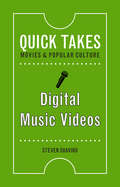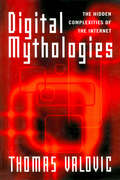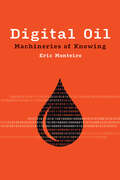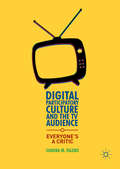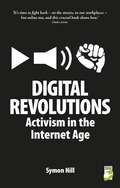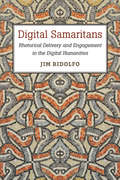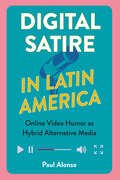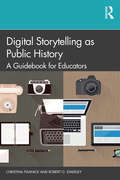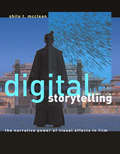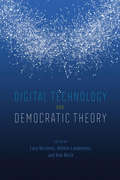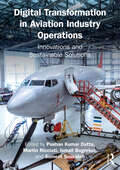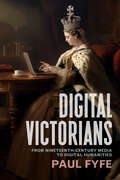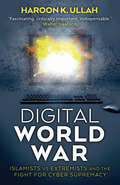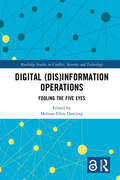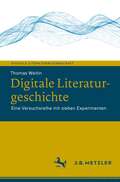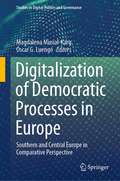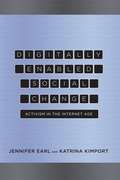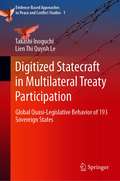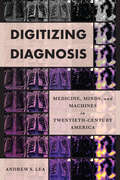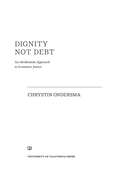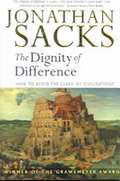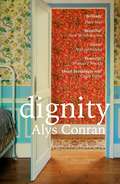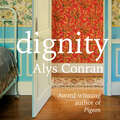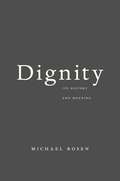- Table View
- List View
Digital Music Videos
by Steven ShaviroMusic videos today sample and rework a century’s worth of movies and other pop culture artifacts to offer a plethora of visions and sounds that we have never encountered before. As these videos have proliferated online, they have become more widely accessible than ever before. In Digital Music Videos, Steven Shaviro examines the ways that music videos interact with and change older media like movies and gallery art; the use of technologies like compositing, motion control, morphing software, and other digital special effects in order to create a new organization of time and space; how artists use music videos to project their personas; and how less well known musicians use music videos to extend their range and attract attention. Surveying a wide range of music videos, Shaviro highlights some of their most striking innovations while illustrating how these videos are creating a whole new digital world for the music industry.
Digital Mythologies: The Hidden Complexities of the Internet
by Thomas ValovicSurf the web. Ride the information highway. Log on to the future. Corporate ad campaigns like these have become pervasive in the 1990s. You're either online, or you're falling behind the times-at least, that's what the media tells us. Ever since the 1990s, when the Internet gained widespread popularity, it has been heralded as one of the best things ever to happen to technology and communications. Commentators expected it to revolutionize how we communicate, do business, and educate our children. Conversely, other pundits have vehemently attacked this technology. Naysayers of "cyberlife" emerged with their warnings of how the Net provides an uncensored, round-the-clock venue for pornography, for inaccurate, simplified information, and is rife with opportunities to violate our right to privacy. In Digital Mythologies, Thomas Valovic hopes to raise the level of discussion by giving a full and balanced picture of how the Net affects our lives. Digital Mythologies, a collection of Valovic's essays, asks hard questions about where computer and communications technology is taking us. Through anecdotes drawn from his experiences as former editor-in-chief of Telecommunications magazine, the author gives readers an insider's peek behind the scenes of the Internet industry. He explores the underlying social and political implications of the Internet and its associated technologies, based on his contention that the cyberspace experience is far more complex than is commonly assumed. Valovic explores these hidden complexities, and points to fascinating connections between the Internet and our contemporary culture.
Digital Oil: Machineries of Knowing (Infrastructures)
by Eric MonteiroHow is digitalization of the offshore oil industry fundamentally changing how we understand work and ways of knowing?Digitalization sits at the forefront of public and academic conversation today, calling into question how we work and how we know. In Digital Oil, Eric Monteiro uses the Norwegian offshore oil and gas industry as a lens to investigate the effects of digitalization on embodied labor, and in doing so shows how our use of new digital technology transforms work and knowing. For years, roughnecks have performed the dangerous and unwieldy work of extracting the oil that lies three miles below the seabed along the Norwegian Continental Shelf. Today, the Norwegian oil industry is largely digital, operated by sensors and driven by data. Digital representations of physical processes inform work practices and decision-making with remotely operated, unmanned deep-sea facilities. Drawing on two decades of in-depth interviews, observations, news clips, and studies of this industry, Eric Monteiro dismantles the divide between the virtual and the physical in Digital Oil. What is gained or lost when objects and processes become algorithmic phenomena with the digital inferred from the physical? How can data-driven work practices and operational decision-making approximate qualitative interpretation, professional judgement, and evaluation? How are emergent digital platforms and infrastructures, as machineries of knowing, enabling digitalization? In answering these questions Monteiro offers a novel analysis of digitalization as an effort to press the limits of quantification of the qualitative.
Digital Participatory Culture and the TV Audience
by Sandra M. FaleroIn this study, Falero explores how online communities of participatory audiences have helped to re-define authorship and audience in the digital age. Using over a decade of ethnographic research, Digital Participatory Culture and the TV Audience explores the rise and fall of a site that some heralded as ground zero for the democratization of television criticism. Television Without Pity was a web community devoted to criticizing television programs. Their mission was to hold television networks and writers accountable by critiquing their work and "not just passively sitting around watching. " When executive producer Aaron Sorkin entered Television Without Pity's message boards on The West Wing in late 2001, he was surprised to find the discussion populated by critics rather than fans. His anger over the criticism he found there wound up becoming a storyline in a subsequent episode of The West Wing wherein web critics were described as "obese shut-ins who lounge around in muumuus and chain-smoke Parliaments. " This book examines the culture at Television Without Pity and will appeal to students and researchers interested in audiences, digital culture and television studies.
Digital Revolutions
by Symon HillFrom Occupy to Uncut, from the Arab Spring to the Slutwalk movement, few questions about recent activism raise as much controversy as the role of the internet. This book suggests that the internet is a tool, not a cause, of social change. It has profoundly affected the way people communicate, making it easier to find the truth, to learn from activists on the other side of the world, to co-ordinate campaigns without hierarchy and to expose governments and corporations to public ridicule. But it has also helped those same governments and corporations to spy on activists, to disrupt campaigns and to create illusions of popular support.Focused on the real-life experiences of activists rather than theory or abstract statistics, Digital Revolutions asks how the internet has affected activism, how it has allowed movements to go global more quickly and what the future holds for corporations and social movements that are doing battle online.Symon Hill has campaigned on the arms trade, religious liberty, same-sex marriage, disability rights, and economic injustice. He has worked with the Campaign Against Arms Trade and the Fellowship of Reconciliation, and was a founding member of Christianity Uncut. He has trained hundreds of activists in campaigning skills and media engagement. In February 2012 he was dragged by police from the steps of St. Paul's Cathedral during the eviction of Occupy London Stock Exchange. He is associate director of the Ekklesia think tank and associate tutor at the Woodbrooke Quaker Study Centre. He writes for The Guardian, Morningstar, The Friend, and Third Way. His first book was The No-Nonsense Guide to Religion.
Digital Samaritans: Rhetorical Delivery And Engagement In The Digital Humanities
by Jim RidolfoDigital Samaritans explores rhetorical delivery and cultural sovereignty in the digital humanities. The exigence for the book is rooted in a practical digital humanities project based on the digitization of manuscripts in diaspora for the Samaritan community, the smallest religious/ethnic group of 770 Samaritans split between Mount Gerizim in the Palestinian Authority and in Holon, Israel. Based on interviews with members of the Samaritan community and archival research, Digital Samaritans explores what some Samaritans want from their diaspora of manuscripts, and how their rhetorical goals and objectives relate to the contemporary existential and rhetorical situation of the Samaritans as a living, breathing people. How does the circulation of Samaritan manuscripts, especially in digital environments, relate to their rhetorical circumstances and future goals and objectives to communicate their unique cultural history and religious identity to their neighbors and the world? Digital Samaritans takes up these questions and more as it presents a case for collaboration and engaged scholarship situated at the intersection of rhetorical studies and the digital humanities.
Digital Satire in Latin America: Online Video Humor as Hybrid Alternative Media (Reframing Media, Technology, and Culture in Latin/o America)
by Paul AlonsoHow creators of online video critique politics and society and amplify public discourse in Latin American countries This book analyzes how digital-native audiovisual satire has become increasingly influential in national public debates within Latin America. Paul Alonso illuminates the role of online video in filling gaps in sociopolitical critique left by television, traditional journalism, and commercial entertainment while exposing some of the prevalent tensions of the region.Alonso draws on interviews and analyzes media content to consider some of the most representative and influential satirical shows born on the internet and produced in Argentina, Colombia, Ecuador, Peru, Mexico, and Latinx communities in the United States. He discusses YouTubers Chumel Torres, Malena Pichot, Guille Aquino, Joanna Hausmann, and El Cacash; the Enchufe.tv collective; and the video columnists Maria Paulina Baena from La Pulla and Mariángela Urbina from Las Igualadas. These creators use professional and non-mainstream practices and resources to dismantle fake news, highlight social tensions, and offer in-depth content that goes beyond confrontational attacks.In contexts of highly ideological polarization, Alonso argues, digital satire is a unique type of hybrid alternative media that can articulate nonpartisan interpretations of reality while also questioning, deconstructing, and subverting the authoritative role of media. Satiric voices can offer an informed, reflexive, argumentative, or historically rooted perspective that amplifies public discourse and shapes changing notions of journalism and political communication in democratic societies. A volume in the series Reframing Media, Technology, and Culture in Latin/o America, edited by Héctor Fernández L’Hoeste and Juan Carlos Rodríguez Publication of this work made possible by a Sustaining the Humanities through the American Rescue Plan grant from the National Endowment for the Humanities.
Digital State: The Story of Minnesota's Computing Industry
by Thomas J. MisaAccounts of the early events of the computing industry—the Turing machine, the massive Colossus, the ENIAC computer—are well-told tales, and equally well known is the later emergence of Silicon Valley and the rise of the personal computer. Yet there is an extraordinary untold middle history—with deep roots in Minnesota. From the end of World War II through the 1970s, Minnesota was home to the first computing-centered industrial district in the world.Drawing on rare archival documents, photographs, and a wealth of oral histories, Digital State unveils the remarkable story of computer development in the heartland after World War II. These decades found corporations—concentrated in large part in Minnesota—designing state-of-the-art mainframe technologies, revolutionizing new methods of magnetic data storage, and, for the first time, truly integrating software and hardware into valuable products for the American government and public. Minnesota-based companies such as Engineering Research Associates, Univac, Control Data, Cray Research, Honeywell, and IBM Rochester were major international players and together formed an unrivaled epicenter advancing digital technologies. These companies not only brought vibrant economic growth to Minnesota, they nurtured the state&’s present-day medical device and software industries and possibly even tomorrow&’s nanotechnology.Thomas J. Misa&’s groundbreaking history shows how Minnesota recognized and embraced the coming information age through its leading-edge companies, its workforce, and its prominent institutions. Digital State reveals the inner workings of the birth of the digital age in Minnesota and what we can learn from this era of sustained innovation.
Digital Storytelling as Public History: A Guidebook for Educators
by Christina Fisanick Robert O. StakeleyDigital Storytelling as Public History: A Guidebook for Educators provides a practical methodology for teaching public history in the digital age. Drawing on a long-standing collaboration, Fisanick and Stakeley examine how and why educators in all arenas should adopt digital storytelling as a means for encouraging interest in local and regional history. The book shows readers how to implement the strategies necessary to help storytellers in a variety of settings create short films that showcase the collections at local and regional historical societies and museums. It also teaches storytellers higher executive functions, such as independent project management, peer and self-critique, and rhetorical savviness. By guiding storytellers through this process of creating public history digital stories, the book enables them to become connected to communities, improve their understanding of regional history, and expand their knowledge of the preservation of historical artifacts. Supported by online handouts and offering a comprehensive methodology for educators, this is the ideal guide for those teaching public history in the digital age across a range of educational settings, including the classroom, museum and community.
Digital Storytelling: The Narrative Power of Visual Effects in Film (The\mit Press Ser.)
by Shilo T. McCleanHow digital visual effects in film can be used to support storytelling: a guide for scriptwriters and students.Computer-generated effects are often blamed for bad Hollywood movies. Yet when a critic complains that "technology swamps storytelling" (in a review of Van Helsing, calling it "an example of everything that is wrong with Hollywood computer-generated effects movies"), it says more about the weakness of the story than the strength of the technology. In Digital Storytelling, Shilo McClean shows how digital visual effects can be a tool of storytelling in film, adding narrative power as do sound, color, and "experimental" camera angles—other innovative film technologies that were once criticized for being distractions from the story. It is time, she says, to rethink the function of digital visual effects.Effects artists say—contrary to the critics—that effects always derive from story. Digital effects are a part of production, not post-production; they are becoming part of the story development process. Digital Storytelling is grounded in filmmaking, the scriptwriting process in particular. McClean considers crucial questions about digital visual effects—whether they undermine classical storytelling structure, if they always call attention to themselves, whether their use is limited to certain genres—and looks at contemporary films (including a chapter-long analysis of Steven Spielberg's use of computer-generated effects) and contemporary film theory to find the answers. McClean argues that to consider digital visual effects as simply contributing the "wow" factor underestimates them. They are, she writes, the legitimate inheritors of film storycraft.
Digital Technology and Democratic Theory
by Hélène Landemore Rob Reich Lucy BernholzOne of the most far-reaching transformations in our era is the wave of digital technologies rolling over—and upending—nearly every aspect of life. Work and leisure, family and friendship, community and citizenship have all been modified by now-ubiquitous digital tools and platforms. Digital Technology and Democratic Theory looks closely at one significant facet of our rapidly evolving digital lives: how technology is radically changing our lives as citizens and participants in democratic governments. To understand these transformations, this book brings together contributions by scholars from multiple disciplines to wrestle with the question of how digital technologies shape, reshape, and affect fundamental questions about democracy and democratic theory. As expectations have whiplashed—from Twitter optimism in the wake of the Arab Spring to Facebook pessimism in the wake of the 2016 US election—the time is ripe for a more sober and long-term assessment. How should we take stock of digital technologies and their promise and peril for reshaping democratic societies and institutions? To answer, this volume broaches the most pressing technological changes and issues facing democracy as a philosophy and an institution.
Digital Transformation in Aviation Industry Operations: Innovations and Sustainable Solutions
by Pushan Kumar Dutta Ismail Bogrekci Martin Ricciuti Sumeet SuseelanDigital Transformation in Aviation Industry Operations explores the transformative technologies driving a new era in aviation, focusing on solutions that streamline operations, enhance passenger experience, promote safety, and support sustainable practices. This book provides a comprehensive look at how digital tools are reshaping the airline industry. Focusing on emerging technologies, this textbook offers the most up-to-date treatment of the ways digital innovations are transforming the aviation industry. Covering aspects from communications and weather forecasting to fuel and energy considerations, the book gives readers invaluable insights into how aviation continues to evolve as new technologies are applied. Aimed at postgraduate students and researchers in aviation and operations management, Digital Transformation in Aviation Industry Operations showcases how digital technology can leverage better profitability, sustainability, and improved efficiencies in the aviation industry. It is an essential guide for anyone looking to harness the power of digital transformation in an aviation context.
Digital Victorians: From Nineteenth-Century Media to Digital Humanities (Stanford Text Technologies)
by Paul FyfePerhaps no period better clarifies our current crisis of digital information than the nineteenth century. Self-aware about its own epochal telecommunications changes and awash in a flood of print, the nineteenth century confronted the consequences of its media shifts in ways that still define contemporary responses. In this authoritative new work, Paul Fyfe argues that writing about Victorian new media continues to shape reactions to digital change. Among its unexpected legacies are what we call digital humanities, characterized by the self-reflexiveness, disciplinary reconfigurations, and debates that have made us digital Victorians, so to speak, struggling again to resituate humanities practices amid another technological revolution. Engaging with writers such as Thomas De Quincey, George Eliot, George du Maurier, Henry James, and Robert Louis Stevenson who confronted the new media of their day, Fyfe shows how we have inherited Victorian anxieties about quantitative and machine-driven reading, professional obsolescence in the face of new technology, and more—telling a longer history of how writers, readers, and scholars adapt to dramatically changing media ecologies, then and now. The result is a predigital history for the digital humanities through nineteenth-century encounters with telecommunication networks, privacy intrusions, quantitative reading methods, remediation, and their effects on literary professionals. As Fyfe demonstrates, well before computers, the Victorians were already digital.
Digital World War: Islamists, Extremists, and the Fight for Cyber Supremacy
by Haroon UllahThe role of social media in the events of the Arab Spring and its aftermath in the Muslim world has stimulated much debate, yet little in the way of useful insight. Now Haroon Ullah, a scholar and diplomat with deep knowledge of politics and societies in the Middle East, South Asia, and Southeast Asia, draws the first clear picture of the unprecedented impact of Twitter, Facebook, and other means of online communication on the recent revolutions that blazed across Muslim nations. The author carefully analyzes the growth of social media throughout the Muslim world, tracing how various organizations learned to employ such digital tools to grow networks, recruit volunteers, and disseminate messages. In Egypt, where young people rose against the regime; in Pakistan, where the youth fought against the intelligence and military establishments; and in Syria, where underground Islamists had to switch alliances, digital communications played key roles. Ullah demonstrates how social media have profoundly changed relationships between regimes and voters, though not always for the better. Looking forward he identifies trends across the Muslim world and the implications of these for regional and international politics.
Digital: Fooling the Five Eyes (Routledge Studies in Conflict, Security and Technology)
by Melissa-Ellen DowlingThis book offers an interdisciplinary insight into the key debates around information warfare in the digital age and argues that transnational cooperation can mitigate the threat.States and societies are increasingly vulnerable to cyber-enabled information operations. From efforts to divide nations, undermine public policy, manipulate elections, and generate social discord, malign actors use the online realm to wreak havoc on our offline lives. The book explores the digital disinformation dilemma that confronts liberal democracies, reflecting on shared socio-political challenges and solutions to contemporary information operations amongst the Five Eyes states and beyond. The work aims to generate a holistic human-centric perspective on the challenges of digital (dis)information operations through interdisciplinary insight into shared challenges and solutions to contemporary information warfare. Together, these perspectives enable us to more effectively identify opportunities to address the challenge and increase the potential to enrich international collaborative efforts to safeguard liberal democracies from threats to their information environments.This book will be of much interest to students of information warfare, intelligence studies, foreign policy and International Relations.Chapter 1 of this book is freely available as a downloadable Open Access PDF at http://www.taylorfrancis.com under a Creative Commons Attribution-Non Commercial-No Derivatives (CC-BY-NC-ND) 4.0 license.
Digitale Literaturgeschichte: Eine Versuchsreihe mit sieben Experimenten (Digitale Literaturwissenschaft)
by Thomas WeitinMit digitalen Methoden sehen wir die Literaturgeschichte vollständig – Analysen großer Textmengen konfrontieren den gelehrten Kanon meist männlicher Autoren mit Werken, die das kulturelle Gedächtnis verdrängt hat. Viele von ihnen stammen von Frauen. Digitale Literaturgeschichte erläutert Methoden zum Vergleich weiblichen und männlichen Schreibens, die von der Stilometrie über maschinelles Lernen bis zur Netzwerkanalyse reichen, und zeigt, warum viele Autorinnen in Vergessenheit geraten sind. Alle Daten und Code-Dateien werden zur Verfügung gestellt – so entsteht Literaturgeschichte zum Mitmachen.
Digitalization of Democratic Processes in Europe: Southern and Central Europe in Comparative Perspective (Studies in Digital Politics and Governance)
by Magdalena Musiał-Karg Óscar G. LuengoThis book explores the digital transformations of democracy and democratic societies. It examines the various challenges posed by these transformations in the context of political practice and to theoreticians of democracy and political communication. The authors present studies from different countries, related to various effects of digitalization processes. Topics covered include, but are not limited to: Innovation in civil society research, new forms of civic participation, new dimensions of democratization and local governance processes, political changes and public participation, civic and political activities, political campaigning or other phenomenon driven by the implementation of information and communications technology (ICT) into politics. Therefore, the book is a must-read for all scholars and researchers of political science, practitioners, and policy-makers, interested in a better understanding of digital politics, digitalization processes, and democracy in general.
Digitally Enabled Social Change: Activism in the Internet Age
by Jennifer Earl Katrina KimportAn investigation into how specific Web technologies can change the dynamics of organizing and participating in political and social protest. Much attention has been paid in recent years to the emergence of "Internet activism," but scholars and pundits disagree about whether online political activity is different in kind from more traditional forms of activism. Does the global reach and blazing speed of the Internet affect the essential character or dynamics of online political protest? In Digitally Enabled Social Change, Jennifer Earl and Katrina Kimport examine key characteristics of web activism and investigate their impacts on organizing and participation. Earl and Kimport argue that the web offers two key affordances relevant to activism: sharply reduced costs for creating, organizing, and participating in protest; and the decreased need for activists to be physically together in order to act together. Drawing on evidence from samples of online petitions, boycotts, and letter-writing and e-mailing campaigns, Earl and Kimport show that the more these affordances are leveraged, the more transformative the changes to organizing and participating in protest.
Digitized Statecraft in Multilateral Treaty Participation: Global Quasi-Legislative Behavior of 193 Sovereign States (Evidence-Based Approaches to Peace and Conflict Studies #1)
by Takashi Inoguchi Lien Thi LeThis book is a rarity in that it opens a genuinely creative new vista for understanding global politics as distinguished from international politics, enhancing the vision for understanding global subjects such as multilateral treaties and the Covid-19 virus. Six hundred multilateral treaties deposited in the UN are conceptualized as a bundle of quasi-social contracts by sovereign states. A state’s participation in multilateral treaties is envisaged as digitized statecraft. Using a state’s physical actions and treaties’ attributes, 193 profiles of statecraft are analyzed with the implications for the future of global politics. This book demonstrates that multilateral treaties are both a vehicle and an agency in the globalization trend; thus, both state and international actors influence a state’s joining multilateral treaties. The book represents a marriage of international law and applied information science. It provides a framework for empirical modeling based on artificial intelligence and analyzes this framework in terms of international law and international relations. This book thus creates a new understanding of global politics.
Digitizing Diagnosis: Medicine, Minds, And Machines In Twentieth-century America (Studies In Computing And Culture Ser.)
by Andrew S. LeaDignity Not Debt: An Abolitionist Approach to Economic Justice
by Chrystin OndersmaAn earth-shaking reimagining of household debt that opens up a new path to financial security for all Americans. American households have a debt problem. The problem is not, as often claimed, that Americans recklessly take on too much debt. The problem is that US debt policies have no basis in reality. Weaving together the histories and trends of US debt policy with her own family story, Chrystin Ondersma debunks the myths that have long governed debt policy, like the belief that debt leads to prosperity or the claim that bad debt is the result of bad choices, both of which nest in the overarching myth of a free market unhindered by government interference and accessible to all. In place of these stale narratives, Ondersma offers a compelling, flexible, and reality-based taxonomy rooted in the internationally recognized principle of human dignity. Ondersma’s new categories of debt—grounded in abolitionist principles—revolutionize how policymakers are able to think about debt, which will in turn revolutionize the American debt landscape itself.
Dignity of Difference: How to Avoid the Clash of Civilizations
by Jonathan SacksThe year 2001 began as the United Nations Year of Dialogue between Civilizations. By its end, the phrase that came most readily to mind was 'the clash of civilizations.' The tragedy of September 11 intensified the danger caused by religious differences around the world. As the politics of identity begin to replace the politics of ideology, can religion become a force for peace? <p><p> The Dignity of Difference is Rabbi Jonathan Sacks's radical proposal for reconciling hatreds. The first major statement by a Jewish leader on the ethics of globalization, it also marks a paradigm shift in the approach to religious coexistence. Sacks argues that we must do more than search for values common to all faiths; we must also reframe the way we see our differences.
Dignity: From the award-winning author of Pigeon
by Alys ConranShortlisted for the Wales Book of the Year award'I loved this... Magda is a real stand-out character for me in books I've read recently, I can't quite stop thinking about her' Jane Garvey, BBC Woman's Hour 'Brilliant... A truly convincing state-of-the-nation novel' Daily Mail 'Packs a powerful punch and makes you smile while breaking your heart'Woman's Weekly 'Fierce and compassionate'Mail on Sunday 'Conran's work is subtle and complex: there is no one right story about the Empire. Instead we are offered multiple views, ironies and contradictions that only one of most talented, tender writers in Wales could portray'New Welsh Review 'Fierce, compassionate, angry, but above all, heart-breakingly real. I was drawn in from the very first page'Claire Fuller, author of Bitter Orange 'An Indian household can no more be governed peacefully without dignity and prestige, than an Indian Empire' The Complete Indian Housekeeper and Cook, Flora Annie Steel & Grace Gardiner Magda is a former scientist with a bad temper and a sharp tongue, now living alone in a huge house by the sea. Confined to a wheelchair, her once spotless home crumbling around her, she gets through carers at a rate of knots. Until Susheela arrives, bursting through the doors of Magda's house, carrying life with her: grief for her mother's recent death; worry for her father; longing for a beautiful and troubled young man.The two women strike up an unlikely friendship: Magda's old-fashioned, no-nonsense attitude turns out to be an unexpected source of strength for Susheela; and Susheela's Bengali heritage brings back memories of Magda's childhood in colonial India and resurrects the tragic figure of her mother, Evelyn, and her struggle to fit within the suffocating structure of the Raj's ruling class. But as Magda digs deeper into her past, she unlocks a shocking legacy of blood that threatens to destroy the careful order she has imposed on her life - and that might just be the key to give the three women, Evelyn, Magda and Susheela, a place they can finally call home.'An exquisite novel: compassionate, beautiful and unflinching. I'm full of admiration for the skill with which it draws connections between the past and present, and manages to feel both timeless and achingly contemporary'Fiona McFarlane, author of The Night Guest
Dignity: From the award-winning author of Pigeon
by Alys ConranMagda lives alone in her a huge house by the sea. Bad tempered and elderly, Magda does not need help from anyone, despite being wheelchair bound. With her sharp tongue, she gets through carers at a rate of knots, until Susheela arrives. And Susheela, it turns out, is in even more trouble than Magda. Still reeling from the recent death of her mum and trying to prop up her dad who is at risk of losing the family business, she finds she is pregnant. The future suddenly looks uncertain and frightening. But Magda and Susheela strike up an unlikely and sometimes uneasy friendship. Magda finds herself thinking back to her early childhood in colonial India before she was sent "home" to England; a childhood filled with servants and privilege but also terrible secrets. We also follow the story of her mother, Evelyn, once a warm hearted, and free spirited school teacher who slowly has all life and optimism ground away by a controlling husband and the misery of being a respectable member of the ruling classes. What becomes clear is that Evelyn searched for home for a long time, just like Magda, just like Susheela. And Magda begins to realise that home might not be a fortress to be ferociously defended, but may mean something else altogether. Thoughtful, clever, and beautifully observed Dignity considers the legacy of the Raj in Britain today, but more importantly what it means to belong to a place and to other people.(p) Orion Publishing Group Ltd 2019
Dignity: Its History and Meaning
by Michael RosenDignity plays a central role in current thinking about law and human rights, but there is sharp disagreement about its meaning. Combining conceptual precision with a broad historical background, Michael Rosen puts these controversies in context and offers a novel, constructive proposal. “Penetrating and sprightly…Rosen rightly emphasizes the centrality of Catholicism in the modern history of human dignity. His command of the history is impressive…Rosen is a wonderful guide to the recent German constitutional thinking about human dignity…[Rosen] is in general an urbane and witty companion, achieving his aim of accessibly written philosophy.” —Samuel Moyn, The Nation “[An] elegant, interesting and lucid exploration of the concept of dignity...Drawing on classical, liberal and Catholic traditions, Rosen hopes to rehabilitate dignity to its rightful place near the centre of moral thought...Rosen's admirable book deserves wide attention from political theorists, jurisprudes and political philosophers.” —Simon Blackburn, Times Higher Education “Dignity deserves to be widely read, not only for its intrinsic interest, but also as a corrective to the habit of discussing such topics in abstraction from their social context. Whether or not one agrees with Rosen's arguments, there can be no doubt he has widened our horizons.” —Rae Langton, Times Literary Supplement
